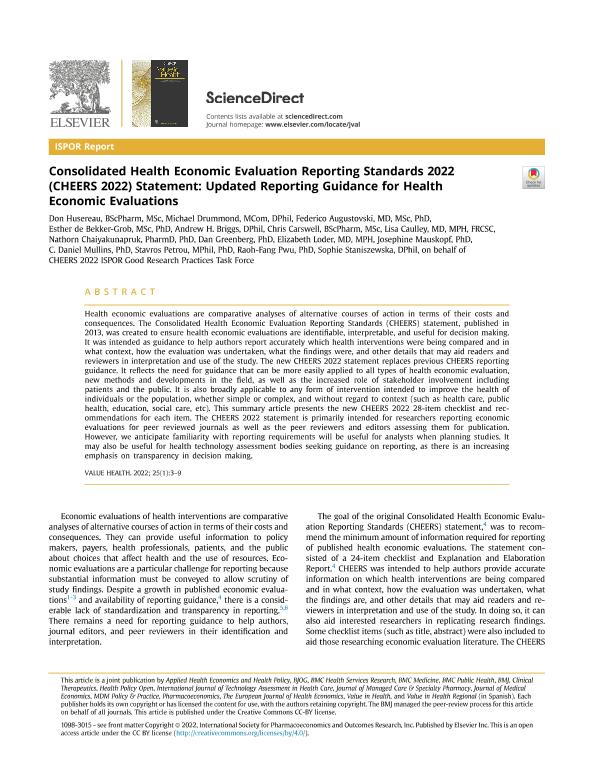Mostrar el registro sencillo del ítem
dc.contributor.author
Husereau, Don
dc.contributor.author
Drummond, Michael
dc.contributor.author
Augustovski, Federico Ariel

dc.contributor.author
de Bekker Grob, Esther
dc.contributor.author
Briggs, Andrew H.
dc.contributor.author
Carswell, Chris
dc.contributor.author
Caulley, Lisa
dc.contributor.author
Chaiyakunapruk, Nathorn
dc.contributor.author
Greenberg, Dan
dc.contributor.author
Loder, Elizabeth
dc.contributor.author
Mauskopf, Josephine
dc.contributor.author
Mullins, C. Daniel
dc.contributor.author
Petrou, Stavros
dc.contributor.author
Pwu, Raoh Fang
dc.contributor.author
Staniszewska, Sophie
dc.date.available
2023-10-31T13:45:22Z
dc.date.issued
2022-01
dc.identifier.citation
Husereau, Don; Drummond, Michael; Augustovski, Federico Ariel; de Bekker Grob, Esther; Briggs, Andrew H.; et al.; Consolidated Health Economic Evaluation Reporting Standards 2022 (CHEERS 2022) Statement: Updated Reporting Guidance for Health Economic Evaluations; Elsevier; Value In Health; 25; 1; 1-2022; 3-9
dc.identifier.issn
1098-3015
dc.identifier.uri
http://hdl.handle.net/11336/216599
dc.description.abstract
Health economic evaluations are comparative analyses of alternative courses of action in terms of their costs and consequences. The Consolidated Health Economic Evaluation Reporting Standards (CHEERS) statement, published in 2013, was created to ensure health economic evaluations are identifiable, interpretable, and useful for decision making. It was intended as guidance to help authors report accurately which health interventions were being compared and in what context, how the evaluation was undertaken, what the findings were, and other details that may aid readers and reviewers in interpretation and use of the study. The new CHEERS 2022 statement replaces previous CHEERS reporting guidance. It reflects the need for guidance that can be more easily applied to all types of health economic evaluation, new methods and developments in the field, as well as the increased role of stakeholder involvement including patients and the public. It is also broadly applicable to any form of intervention intended to improve the health of individuals or the population, whether simple or complex, and without regard to context (such as health care, public health, education, social care, etc). This summary article presents the new CHEERS 2022 28-item checklist and recommendations for each item. The CHEERS 2022 statement is primarily intended for researchers reporting economic evaluations for peer reviewed journals as well as the peer reviewers and editors assessing them for publication. However, we anticipate familiarity with reporting requirements will be useful for analysts when planning studies. It may also be useful for health technology assessment bodies seeking guidance on reporting, as there is an increasing emphasis on transparency in decision making.
dc.format
application/pdf
dc.language.iso
eng
dc.publisher
Elsevier

dc.rights
info:eu-repo/semantics/openAccess
dc.rights.uri
https://creativecommons.org/licenses/by/2.5/ar/
dc.subject
COST-BENEFIT ANALYSIS
dc.subject
ECONOMIC EVALUATION
dc.subject
GUIDANCE
dc.subject
METHODS
dc.subject
REPORTING
dc.subject.classification
Otras Ciencias de la Salud

dc.subject.classification
Ciencias de la Salud

dc.subject.classification
CIENCIAS MÉDICAS Y DE LA SALUD

dc.title
Consolidated Health Economic Evaluation Reporting Standards 2022 (CHEERS 2022) Statement: Updated Reporting Guidance for Health Economic Evaluations
dc.type
info:eu-repo/semantics/article
dc.type
info:ar-repo/semantics/artículo
dc.type
info:eu-repo/semantics/publishedVersion
dc.date.updated
2023-10-26T15:11:52Z
dc.journal.volume
25
dc.journal.number
1
dc.journal.pagination
3-9
dc.journal.pais
Países Bajos

dc.journal.ciudad
Amsterdam
dc.description.fil
Fil: Husereau, Don. University of Ottawa; Canadá
dc.description.fil
Fil: Drummond, Michael. University of York; Reino Unido
dc.description.fil
Fil: Augustovski, Federico Ariel. Consejo Nacional de Investigaciones Científicas y Técnicas. Oficina de Coordinación Administrativa Parque Centenario. Centro de Investigaciones en Epidemiología y Salud Pública. Instituto de Efectividad Clínica y Sanitaria. Centro de Investigaciones en Epidemiología y Salud Pública; Argentina
dc.description.fil
Fil: de Bekker Grob, Esther. Erasmus University (erasmus University);
dc.description.fil
Fil: Briggs, Andrew H.. London School of Hygiene and Tropical Medicine; Reino Unido
dc.description.fil
Fil: Carswell, Chris. Springer Nature; Nueva Zelanda
dc.description.fil
Fil: Caulley, Lisa. University of Ottawa; Canadá
dc.description.fil
Fil: Chaiyakunapruk, Nathorn. University of Utah; Estados Unidos
dc.description.fil
Fil: Greenberg, Dan. Ben Gurion University of the Negev; Israel
dc.description.fil
Fil: Loder, Elizabeth. Harvard Medical School; Estados Unidos
dc.description.fil
Fil: Mauskopf, Josephine. Rti Health Solutions; Estados Unidos
dc.description.fil
Fil: Mullins, C. Daniel. University of Maryland; Estados Unidos
dc.description.fil
Fil: Petrou, Stavros. University of Oxford; Reino Unido
dc.description.fil
Fil: Pwu, Raoh Fang. Ministry Of Health And Welfare; China
dc.description.fil
Fil: Staniszewska, Sophie. University of Warwick; Reino Unido
dc.journal.title
Value In Health

dc.relation.alternativeid
info:eu-repo/semantics/altIdentifier/doi/http://dx.doi.org/10.1016/j.jval.2021.11.1351
dc.relation.alternativeid
info:eu-repo/semantics/altIdentifier/url/https://www.sciencedirect.com/science/article/pii/S1098301521031466
Archivos asociados
